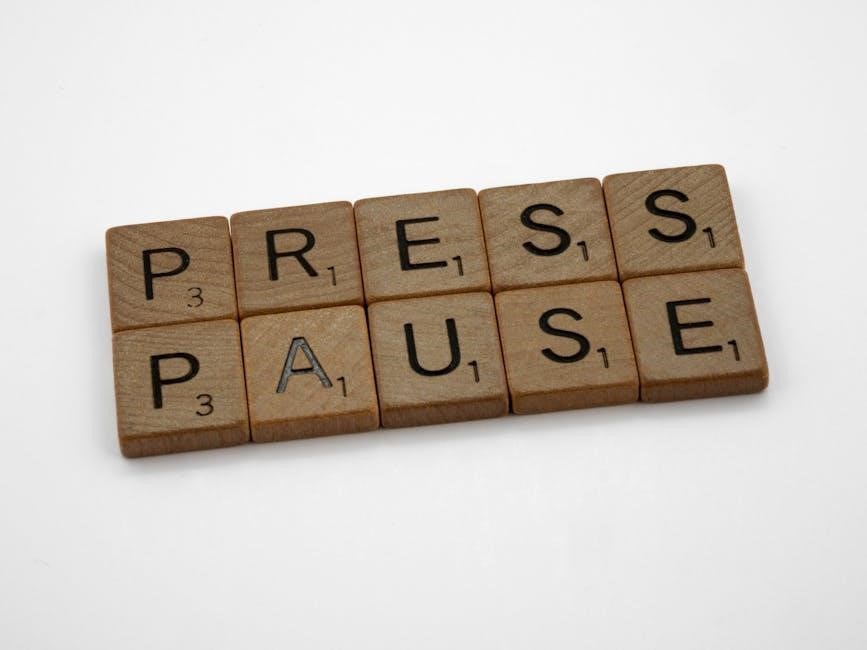Self-heartbreak is a universal experience, often rooted in self-sabotage, negative patterns, and unrealistic expectations. It manifests in people-pleasing, toxic relationships, and a struggle to embrace self-worth.
Meggan Roxanne’s guide offers compassionate insights to break these cycles, heal emotionally, and nurture a healthier relationship with oneself through mindfulness, boundaries, and intentional living.
Understanding the Cycle of Self-Sabotage
Self-sabotage often stems from deep-seated fears, low self-esteem, or past traumas, leading to patterns of negative behavior. These cycles reinforce feelings of unworthiness, creating a vicious loop of self-destruction. By recognizing triggers like perfectionism or people-pleasing, individuals can begin to break free from these harmful habits, ultimately paving the way for emotional healing and personal growth.

The Importance of Self-Love and Acceptance
Self-love and acceptance are foundational to healing from self-heartbreak. They empower individuals to recognize their worth, embrace imperfections, and nurture a compassionate relationship with themselves. By prioritizing self-love, one can break free from external validation and harmful cycles, fostering resilience and emotional well-being. This mindset shift is crucial for building confidence and creating a life filled with love and acceptance.
Recognizing Patterns of Self-Heartbreak
Identifying cycles of self-sabotage, people-pleasing, and unrealistic expectations is key to addressing self-heartbreak. These patterns often stem from negative mindsets and a lack of self-awareness.
Identifying Negative Mindsets and Thought Patterns
Recognizing negative mindsets is crucial to stopping self-heartbreak. Patterns like self-doubt, fear of failure, and all-or-nothing thinking can lead to self-sabotage. These mindsets often stem from deep-seated beliefs and past experiences, creating cycles of emotional pain. By practicing self-reflection and journaling, individuals can identify these harmful thought patterns and begin to challenge them. Understanding the root causes of these mindsets is the first step toward breaking free from their destructive influence and embracing a more compassionate inner dialogue.
The Role of Perfectionism and Unrealistic Expectations
Perfectionism and unrealistic expectations often fuel self-heartbreak by setting unattainable standards. These mindsets create internal pressure, leading to feelings of inadequacy and failure. By striving for an unachievable ideal, individuals may sabotage their progress and relationships. Recognizing these patterns is essential to breaking the cycle. Meggan Roxanne emphasizes the importance of embracing imperfection and redefining success on personal terms, fostering self-compassion and healthier self-perception.

Setting Healthy Boundaries
Setting healthy boundaries is crucial for emotional well-being, enabling you to prioritize your needs and protect your heart from unnecessary pain. By learning to say no and establishing clear limits, you can break cycles of self-sabotage and foster healthier relationships with others and yourself.
Learning to Say No and Prioritize Self-Needs
Learning to say no is an act of self-love and a powerful step in breaking cycles of self-sabotage. By prioritizing your needs, you create boundaries that protect your emotional well-being and foster healthier relationships. Saying no doesn’t mean being selfish; it means valuing yourself enough to step away from people-pleasing and perfectionism. This practice helps you reclaim your power, build self-worth, and cultivate a life aligned with your true desires and values.
Establishing Limits in Relationships
Setting boundaries in relationships is crucial to protect your emotional well-being and prevent self-sabotage. Learning to communicate your needs clearly and respectfully helps you avoid overextending yourself and attracting toxic dynamics. Healthy limits foster mutual respect and understanding, allowing relationships to thrive without compromising your own heart. By prioritizing your emotional safety, you create space for connections that honor your worth and support your growth.
Healing from Self-Sabotage
Healing from self-sabotage involves recognizing patterns and embracing mindfulness. Practical steps help break the cycle, allowing emotional growth and a healthier relationship with oneself to flourish.
Practical Steps to Break Toxic Cycles
Breaking toxic cycles requires intentional actions. Start by setting boundaries, prioritizing self-needs, and practicing mindfulness. Engage in grounding routines like meditation or journaling to clarity. Challenge negative self-talk and embrace self-compassion. Unfollow sources of negativity and distance from toxic relationships. Recognize patterns of self-sabotage and replace them with self-loving habits. Celebrate small victories and honor your emotions to foster healing and growth. These steps empower you to break free and nurture a healthier relationship with yourself.
The Power of Mindfulness and Intentional Living
Mindfulness and intentional living are powerful tools for healing. Starting the day with meditation, journaling, or stretching grounds your mind. Setting intentions helps you stay focused on well-being. By being present, you break self-sabotage cycles, improve clarity, and enhance emotional resilience. These practices foster self-awareness, allowing you to make choices that align with self-love and acceptance, creating a life filled with purpose and inner peace.

Nurturing Self-Love and Confidence
Cultivating self-love involves embracing your true self, fostering self-awareness, and practicing acceptance. It’s about recognizing your worth, letting go of self-doubt, and empowering yourself to grow confidently.

Rediscovering Self-Worth and Confidence
Rediscovering self-worth begins with acknowledging your intrinsic value and challenging negative self-talk. By letting go of perfectionism and embracing your true self, you can rebuild confidence and foster resilience. This process involves self-compassion, recognizing achievements, and aligning actions with personal values. Meggan Roxanne emphasizes the importance of intentional practices like journaling and mindfulness to reconnect with your inner strength and cultivate a positive self-image. This journey empowers individuals to break free from self-doubt and live authentically, fostering a deeper sense of self-love and acceptance. Through these steps, one can gradually restore their confidence and develop a healthier relationship with themselves, leading to emotional well-being and growth.
Cultivating a Positive Inner Dialogue
Cultivating a positive inner dialogue is essential for breaking cycles of self-heartbreak. By replacing negative self-talk with affirmations and self-compassion, you can build confidence and resilience. Meggan Roxanne suggests practices like journaling and mindfulness to help reframe thoughts and foster self-kindness. This shift in mindset allows individuals to embrace their worth and move away from self-sabotaging patterns. Nurturing a supportive inner voice empowers personal growth and strengthens emotional well-being, paving the way for a more loving relationship with oneself.

Building Healthy Relationships
Building healthy relationships begins with setting boundaries and fostering honest communication. Prioritizing mutual respect and emotional well-being helps create lasting connections, free from toxicity and self-sabotage.

Recognizing and Avoiding Toxic Relationships
Recognizing toxic relationships is crucial for emotional well-being. These relationships often involve manipulation, constant criticism, or emotional draining. They can stem from perfectionism or unrealistic expectations, leading to self-sabotage. By setting boundaries and prioritizing self-love, you can avoid such dynamics. Surrounding yourself with supportive individuals fosters healthy connections, while distancing from negativity protects your heart. Mindfulness and intentional living help identify red flags early, empowering you to break free from harmful patterns and nurture relationships built on mutual respect and understanding.
Communicating Effectively in Relationships
Effective communication is vital for healthy relationships. It involves expressing thoughts and feelings clearly while actively listening to others. Setting boundaries ensures emotional safety and mutual respect. Being aware of your emotional state helps convey needs without conflict. Open dialogue fosters trust and understanding, aligning with principles of self-love and acceptance. By prioritizing clear expression and empathy, relationships become stronger and more supportive, helping you avoid self-sabotage and heartbreak.
Practical Tools for Emotional Well-Being
Morning routines, journaling, and mindfulness practices are essential tools for emotional clarity. Starting the day with intention and reflection helps ground and balance the mind, fostering resilience.
Morning Routines for Grounding and Clarity
Starting your day with intention is transformative. Practices like meditation, journaling, or gentle stretching help ground your mind and body, fostering mental clarity and emotional balance; These routines create a foundation for self-awareness, allowing you to break cycles of self-sabotage and nurture a positive mindset. By prioritizing intentional living, you set yourself up for a day of purpose and resilience, aligning with your true needs and desires.

The Role of Journaling in Emotional Healing
Journaling is a powerful tool for emotional healing, offering a safe space to process feelings and gain clarity. By writing down thoughts and emotions, you can release negativity, identify patterns, and cultivate self-awareness. This practice helps break cycles of self-sabotage and fosters a deeper connection with your inner self. Meggan Roxanne emphasizes journaling as a daily ritual to honor your truth, letting go of what no longer serves you and embracing personal growth.

Avoiding Negative Influences
Avoiding negative influences involves unfollowing toxic social media accounts and surrounding yourself with supportive communities to foster emotional healing and self-love and embracing positive interactions.
Unfollowing and Unfriending Sources of Negativity
Unfollowing and unfriending sources of negativity is a powerful step toward healing. Toxic relationships and social media often perpetuate self-doubt and heartbreak. By removing these influences, you create space for positive energies and self-love. Meggan Roxanne emphasizes the importance of curating a supportive environment that uplifts your spirit and helps you break free from harmful cycles. This act of self-care fosters emotional well-being and encourages personal growth.
Surrounding Yourself with Supportive Communities
Building a supportive community is essential for healing and growth. Meggan Roxanne highlights the importance of connecting with individuals who uplift and inspire you. Positive relationships and like-minded communities provide emotional support, reducing feelings of isolation. By surrounding yourself with love and encouragement, you foster resilience and self-love, enabling you to break free from self-sabotaging patterns and embrace a fulfilling life. This supportive network becomes a foundation for lasting emotional well-being and personal transformation.
Embrace self-love and acceptance, breaking free from self-sabotage. Continue nurturing your heart through mindfulness and healthy boundaries, paving the way for a life of love and fulfillment.
Embracing a Life of Love and Acceptance
Embracing a life of love and acceptance is the cornerstone of stopping self-heartbreak. It begins with recognizing your worth and breaking free from cycles of self-sabotage, people-pleasing, and toxic relationships. By setting healthy boundaries, practicing mindfulness, and cultivating self-compassion, you create space for healing and growth. Meggan Roxanne’s guide reminds us that love and acceptance are not just for others—they are for you, too. Start your journey to a life filled with love, confidence, and authenticity.
Continuing the Journey of Self-Healing
Self-healing is a lifelong journey that requires patience, intention, and courage. It involves daily practices like mindfulness, journaling, and grounding routines to maintain clarity and emotional well-being. Meggan Roxanne emphasizes the importance of breaking cycles of self-sabotage and embracing a life of love and acceptance. By surrounding yourself with supportive communities and unfollowing sources of negativity, you create an environment conducive to healing and growth. Each step forward is a testament to your resilience and commitment to a heart-centered life.





